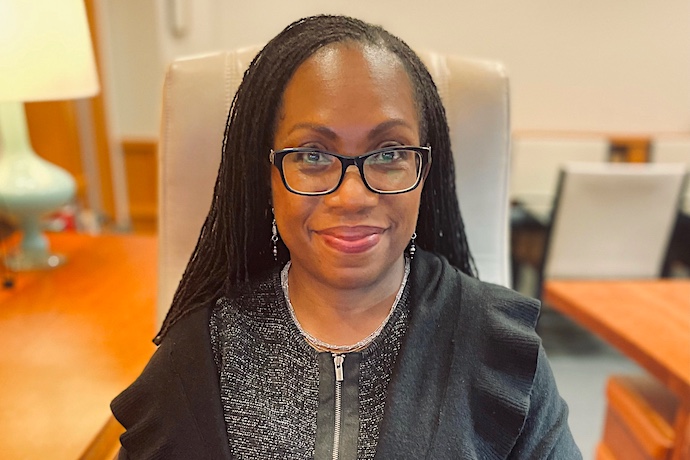By the time you read this, Ketanji Brown Jackson will almost certainly have been confirmed to her seat on the US Supreme Court, barring any last-minute stalling tactics by Republicans or unanticipated defections by Democrats.
Even so—and even though Jackson’s Senate hearings were far more performative than deliberative—it’s worth considering the role faith played in those hearings. It has something to tell us about how the media talks about religion and politics, and about how American society at large talks about them.
Jackson’s confirmation was never in any serious doubt. No Democrats raised any objections to her nomination by Pres. Biden, and rumor had it that even a few Republican senators might vote for her. That left Republicans on the Judiciary Committee to figure out how to score the most political points on a losing hand. They tried their hardest, hammering Jackson over her sentencing in cases related to child pornography, her stance on critical race theory, and whether or not she believed sentencing guidelines should be stiffer.
Jackson couldn’t respond in depth to any of this, and much of it was utterly irrelevant to her role on the Supreme Court. But of course the Republican senators knew that. The point was to position themselves as the mightiest defenders against the liberal onslaught—and occasionally, to position themselves in front of the cameras for Sean Hannity’s show.
One of the weirder moments in the proceedings came when Sen. Lindsey Graham of South Carolina asked Jackson about her faith, pressing her for specifics before abruptly inquiring if she could fairly judge a Catholic. Jackson looked stunned, as though he had asked about her feelings on UFOs. Graham pushed on, wanting to know exactly how important the judge’s faith was to her, asking her to rate it on a scale and how often she attended church. Jackson responded that she strived to separate her personal faith from her work as a jurist, an answer that seemed to satisfy Graham.
Graham was working toward a larger point about how Democrats in his opinion mistreated Amy Coney Barrett when she appeared before the same panel. “How would you feel if a senator up here said of your faith, ‘the dogma lives loudly within you and that’s of concern?'” he asked, referring to something Dianne Feinstein told Barrett in her nomination hearing.
Unsurprisingly, Graham’s words drew condemnation. Jacob Lupfer at Religion News Service derided the use of faith as a “gotcha question,” while Americans United for the Separation of Church and State’s Rob Boston called the line of questioning “inappropriate.”
Rather than frame the story in terms of church and state, Peter Smith, writing for the AP, led with another angle: so what is Jackson’s faith?
Judge Ketanji Brown Jackson has put her religious faith front, center — and vague.
She’s spoken strongly of the role of her faith in her life and career but hasn’t gotten into the specifics of that commitment. Her beliefs have drawn some attention as she undergoes Senate Judiciary Committee hearings this week for her nomination to the Supreme Court.
Surprisingly or not, Smith wasn’t able to uncover anything to indicate church affiliation, leadership, or attendance. After an awkward hinge, his piece moves on to consider “both sides,” speaking to a Jackson supporter from the National African American Clergy Network and a detractor from the conservative Ethics and Public Policy Center.
The premise of Smith’s piece is supremely unhelpful, if you’ll excuse the phrase. For one thing, as Rob Boston points out in his article, there was far more reason to question Barrett about her faith: she had signed a statement opposing legal abortion, taught at the Christian nationalist-sponsored Blackstone Fellowship, and made ambiguous remarks about the role of Catholicism in shaping society. Jackson, by contrast, served on the board of a Baptist school whose website linked to The Baptist Faith and Message 2000.
Taking Graham’s line of questioning at face value implicitly accepts his equivalence between Barrett and Jackson. As the nominee herself said, her record leaves no indication that her beliefs will exert any influence on her ability to rule impartially. Trying to answer Graham’s questions, even if only as the jumping off point for an article, enables his tactic. Put bluntly, repeating bad-faith assertions gives them power. It’s something journalists pride themselves on being trained not to do, yet very often they continue to struggle with it in the post-Trump era.
And make no mistake about it, Graham’s questions were not offered in good faith. People reacting to his interaction with Jackson seemed to think he was grilling her, but I saw something much more passive-aggressive. Anyone who has spent real time in the South knows what it’s like to be asked “What’s your faith?” or “Where do you go to church?” Mostly, these are innocuous questions, more or less the equivalent of asking where someone grew up, albeit with the embedded assumption that one does have a faith.
But those questions can also be used to place someone socially, to determine if they go to the right church, or have the right beliefs, to see if they will fit into the social circle. In some places, it’s a high stakes question, and that’s how Graham wielded it against Jackson, knowing full well that she could neither agree with him that Barrett had been mistreated, nor supply him with an answer he would deem worthy of inclusion into the country club.
It was just another piece of posturing, in other words, despite Graham’s quick and unctuous agreement that there would be no religious test on the nomination. It allowed him to position himself as Barrett’s avenger for the partisans—and as the White leader keeping the Black woman in her place. Lindsey Graham may only go to church three times a year, as he himself admitted, but in the eyes of some of his less savory supporters, that still makes him better than a Black nondenominational Protestant. Pressing his line of questioning—again, even if just to give a story its lede—enables that dynamic.
Let’s pause here to consider whether Graham had a point in saying that Amy Coney Barrett had been wronged by Dianne Feinstein. I don’t think so—Feinstein’s comment about “dogma” certainly seemed prejudicial, but it was likely nothing more than a poorly-phrased attempt to say that Barrett carried some baggage, which she did—and in any event, Barrett made it to the Supreme Court in the end. Certainly, whatever slight she may have suffered in her hearings was not nearly as serious or lasting as Graham made it out to be.
But the reason Feinstein’s remark went astray is of interest. The California senator assumed, as most of us would, that Barrett’s very public Catholicism would be a fair indicator of how she might reason or rule on cases before her. To be fair to Feinstein, she didn’t have much else to go on at the time: at that point, Barrett had never served as a judge at any level. In fact, she had “never tried a case to verdict or argued an appeal in any court,” according to Mother Jones. In other words, Barrett’s thoughts on Catholicism and the law were some of the only material senators had to go on in considering her nomination. Barrett’s woeful grasp of the Constitution— she was unable to name the 5 freedoms included in the First Amendment—led to Feinstein’s line of questioning.
Still, and as much as we all might like it to be otherwise, faith is not a window into the soul, nor into the legal mind. It might give some indications of how a person structures the world, or of their moral commitments. But as both Barrett and Jackson testified repeatedly, jurists at every level are called upon to set aside their personal beliefs to rule impartially, and they do so. And for all of us, ideals seldom correspond to lived behavior in any completely satisfactory way. Humans are inconsistent creatures, simply put, and we don’t often live up to the standards we articulate for ourselves—or to those we believe are given to us by a higher power.
For that reason, attempts to sponsor a nominee like Jackson on the basis of her faith, as several evangelical leaders did at Religion News Service, are bound to fall flat. Holding up religious commitments as evidence of inner morality only enables somebody like Graham to sidetrack the conversation and play gatekeeper in bad faith.
Which is not to say that it’s entirely useless to talk about religion in a context like a judicial nomination. How we talk about our faith, or lack thereof, can give valuable insight into character, wisdom, empathy, and a host of other qualities. But in the end, the most reliable guide to what we’ll do in the future is what we’ve done in the past.
The real difference between Amy Coney Barrett and Ketanji Brown Jackson isn’t their faith, it’s that the former spent a career building an intellectual framework for hard-right conservative jurisprudence, while the latter produced hundreds of rulings fairly and impartially, with reversals by higher courts coming very seldom. That track record earned her confirmations from many of the Republicans who appear to vehemently oppose her nomination this time around, including Sen. Graham, who voted for her twice.
Jackson’s track record is what ought to be evaluated by the Judiciary Committee, not how important faith is in her life, or what happened to one of her predecessors. For all their theatrics and bullying, the questions Ted Cruz, Tom Cotton and Josh Hawley peppered Jackson with about her sentencing practices were more appropriate than Graham’s. It was all performative nonsense, of course—even the National Review agrees—but at least the sentencing questions might have led to some probative evidence.
We would all do well to judge people less by what they say than by what they do. Journalists in particular have an obligation to exercise due skepticism at the public positioning of elected officials, and to evaluate their words in light of past statements and actions. They also have an obligation to set forth their narratives in a way that helps their readers grasp the dynamics of a situation and its implications. I found myself agreeing in a very limited sense with Roger Severino of the Ethics and Public Policy Center, as cited by Peter Smith:
Severino said senators should ask [Jackson] her judicial philosophy in matters such as when claims of religious liberty clash with government actions.
That’s a substantive topic worth a US senator asking about, and a journalist writing on. The specifics of a nominee’s faith and the importance she places on it aren’t worthless by comparison, but they don’t stack up.
###
The author encourages reader feedback and tips: dan@religiondispatches.org





